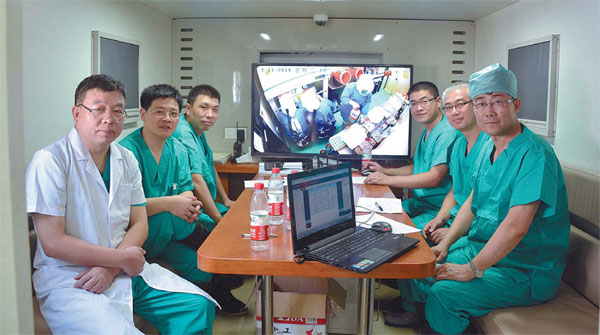Scientist on the front line
Expert has led research into emerging pathogens, from SARS to Ebola
|
Above: Gao Fu (far right) and his team monitor the mobile Ebola testing laboratory in Sierra Leone. Below: Gao Fu talks with a British scientist in the mobile laboratory. Photos Provided to China Daily |
On the team dispatched by the Chinese government to West Africa to combat Ebola, China's top virologist, Gao Fu, who's also a member of the Chinese Academy of Sciences, played different roles.
Many say he is a media-savvy science warrior who fights in his labs as well as at the epicenter of the Ebola epidemic.
In mid-September, he led a 59-member team of public health experts to the worst-hit country, Sierra Leone, setting up and operating a mobile Ebola testing laboratory there.
During the two-month deployment, he also launched a training-of-trainers project, which started with training local senior nurses about epidemic control and prevention. They later served as seeds, spreading their skills widely.
In addition, he was in charge of coordination work with local authorities and other international organizations, such as the World Health Organization, that stayed on the ground for the fight against Ebola.
Gao also served as spokesman for China's medical aid teams in Sierra Leone, receiving interview requests from local media outlets.
"A good scientist and public health expert should also be a good communicator to get health messages across to the people," he says.
As a top scientist in emerging pathogen studies worldwide, Gao says the scientist's work should be expanded from laboratories to the front line of epidemics.
"I'd like to fight the pathogens not only in laboratories but at the center of the killing epidemics," he says, adding that the needs of public health, rather than personal interest or curiosity, should drive the work of scientists.
More important, his two-month deployment on the ground helped him better understand the Ebola virus in areas such as its viral activity and infection pattern.
"The virus did kill but was not so horrible as people thought at first," he says. Many developed countries were initially reluctant to dispatch aid medics to affected areas, citing concerns about staff members' safety.
Within the country, he encouraged health authorities and scientific institutions to strengthen basic research into Ebola for a more preemptive epidemic response.
In the post-Ebola era, Gao was asked, what should China and the world do?
Gao says that China's aid for Ebola control in Africa was just the beginning. "China's aid to the front line in West Africa is in line with the epidemic control strategy highlighting a preemptive approach," he says.
In the future, "China will keep going to Africa when it needs to fight emerging pathogens and that is to protect both the Africans and the Chinese," he says.
For developing countries and international organizations like the WHO, more resources are needed, including funding, and talent should be given incentives to conduct more research into tropical diseases and emerging pathogens, some of which are called "forgotten killers", he adds.
In addition, the whole world should help African countries to build their own public health system and epidemic response capacity, Gao says.
A UK-trained scientist, Gao has also worked in the US and Canada.
During the SARS outbreak in China in 2003, he was at Oxford University and partnered with experts in China to conduct research into the new virus.
To improve public awareness and calm panic, he wrote an article in People's Daily informing the general public of the disease and its prevention.
He says that a combination of resource allocation and coordination, basic research and increased public awareness is the best weapon against viral outbreaks.
The SARS epidemic prompted Gao to return in 2004 to China, where he built an epidemic control system and worked to fight emerging pathogen-caused diseases.
He was appointed as the head of the microbiology institute of the Chinese Academy of Sciences. One year later, his research of the bird flu virus among wild birds at Qinghai Lake was published in Science, one of the world's leading science journals.
He also led research into a variety of other emerging pathogens, such as the bird flu H7N9 virus, H1N1, the peanut-shaped bacteria of streptococcus suis and the Middle East Respiratory Syndrome coronavirus, widely known as MERS-CoV.
MERS never occurred in China, but it was detected in many countries including the US, Saudi Arabia and Egypt, killing hundreds of people.
Gao says related preemptive planning was necessary to prepare the country to handle potential outbreaks. "Viruses never know national borders, and the world should unify when fighting any emerging epidemic," he says.
Similarly, Gao's China-based research benefited the world by containing a potential epidemic. In the spring of 2010, Chinese farmers found that their ducks were producing fewer eggs and eating less than usual, and some even died, reported the Science journal website in March 2011.
Gao led his colleagues at the academy in analyzing the sick ducks and isolated a new flavivirus, a combination of yellow and dengue fevers, the website said.
It was reportedly the first time such a virus had been identified in ducks. Gao said the research mattered for humans as well, because the virus can jump from animals to humans.
His findings were published in leading science journals. Ernest Gould, a virologist and visiting scholar at the University of the Mediterranean Aix-Marseille in France, told Science website that Gao's research findings raised an important alarm with potential implications way beyond the boundaries of China.
"He said a rapidly spreading Chinese flavivirus could mean a global problem," Gould said.
Gao was elected as a member of the Chinese Academy of Sciences in December 2013.
shanjuan@chinadaily.com.cn



















